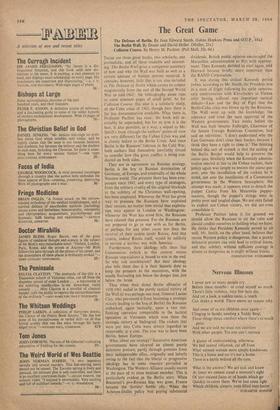The Great Game
THESE are three good books, two scholarly, one journalistic, and all three readable and interest- ing. The Berlin Wall gives a competent summary of how and why the Wall was built as well as a certain amount of human interest material. It contains, however, little that is not also included in The Defense of Berlin which covers its subject magisterially from the end of the Second World War to mid-1962: the bibliography alone runs to some nineteen pages of small print. As for Collision Course, this also is a scholarly study, of the Cuba crisis of 1962, though here there is far less documentation available. What there is, Professor Pachter has read: his book will in- evitably be superseded, but for us now it is the best. It also provides, in a way, a sequel to Mr. Smith's book (though the authors' points of view are very different) for the Cuban Crisis was and is closely linked to the Berlin Crisis. And since Berlin is the Russians' fulcrum in the Cold War, both authors find themselves inevitably forced to consider how this great conflict is being con- ducted on both sides.
They are in agreement on Russian strategy. Berlin is the key to Russian domination of Germany, of Europe, and eventually of the whole Western world. The pressure there has been ever- present since 1945, and every type of stratagem, from the military crudity of the original blockade to the subtlety of the Christmas wall-opening, has been employed. Whenever the West has given way to pressure the Russians have exploited their success, no matter how trivial that exploita- tion may appear in London or Washington: whenever the West has stood firm, the Russians have relaxed that pressure. For the Russians are not prepared to go to war with us for Berlin, or perhaps for any other cause less than the survival of their system inside Russia. And that system, indeed Russia itself, would be unlikely to survive a nuclear war with America.
Furthermore, their ideology tells them that Communism (which in this context means Russian imperialism) is bound to win in the end. So why risk annihilation? But their ideology also tells them that it is their historic duty to keep the pressure to the maximum, with the needle fluctuating just below the danger line, just below the brink.
Thus when their direct Berlin offensive of 1958-1961 ended in the purely tactical victory of the Wall (it was perhaps one man, General Lucius Clay, who prevented it from becoming a strategic victory leading to the loss of Berlin) the Russians embarked, again tactically, upon a vast out- flanking operation comparable to the tactical operation at Voronezh which won them the strategic victory at Stalingrad. The rockets that were put into Cuba were always regarded as removable, at a cost. The cost was to have been Berlin, hence Europe.
What about our strategy? Successive American governments have adopted an almost purely defensive posture, partly through pressure from their indispensable allies, originally and latterly owing to the fact that the liberal or progressive ideology has in some measure prevailed in Washington. The Western Alliance usually moves at the pace of its most hesitant member. This is particularly evident in the Berlin story. When Roosevelt's pro-Russian bias was gone, France became the Soviets' feeble • ally. When the Acheson-Dulles 'pOlicy WAS' paying suhstantiai
dividends, British public opinion encouraged the Macmillan administration to flirt with appease- ment. Then Kennedy decided to start again, and Harvard became briefly more important than the RAND Corporation.
It was during this critical Kennedy period (when, according to Mr. Smith, the President was in a state of fright following his quite unneces- sary confrontation with Khrushchev in Vienna after having suffered two important tactical defeats—Laos and the Bay of Pigs) that the Berlin-Cuba crisis was blown up by the Russians. The Wall went up with the knowledge, the tolerance and even the tacit approval of the Western governments. Two weeks before the Wall was built Senator Fulbright, Chairman of the Senate Foreign Relations Committee, had said on television : '1 don't understand why the East Germans don't close their border, because I think they have a right to close it.' The thinking behind this sort of remark is that the sealing of the Berlin Border would help to preserve the status quo. Similarly when the Kennedy adminis- tration reacted at last to the Cuban rockets, their policy again was simply to restore the status quo ante, ante the installation of the rockets be it noted, not ante the installation of a Communist government in the Western hemisphere. No attempt was made, it appears, even to detach the puppet Castro from his Muscovite puppet- masters, though the puppet's strings were in pretty poor and tangled shape. We not only failed to exploit our Cuban victory, we did not even consolidate it.
Professor Pachter takes it for granted we should allow the Russians to set the rules and should confine ourselves to holding what we have. He thinks that President Kennedy served us all well. M r. Smith, on the other hand, believes that recent Western policy is dangerous, that a purely defensive posture can only lead to critical losses, and that subtlety without sufficient courage is almost as dangerous as is might without brains.
CONSTANTINE FITZGIBBON








































 Previous page
Previous page